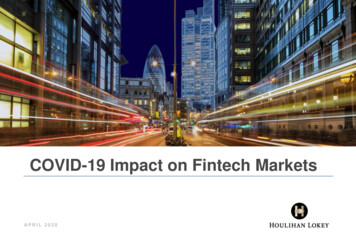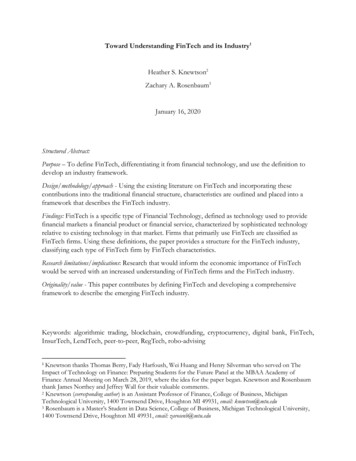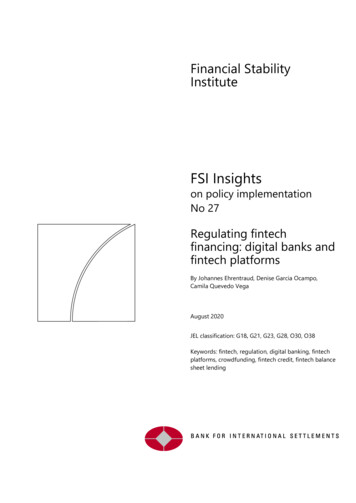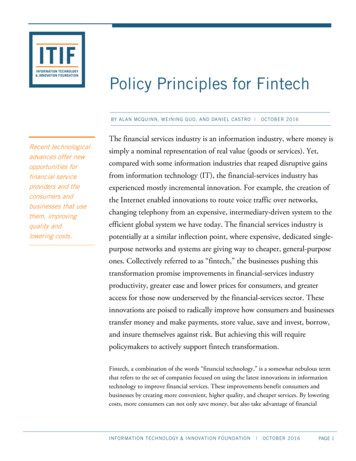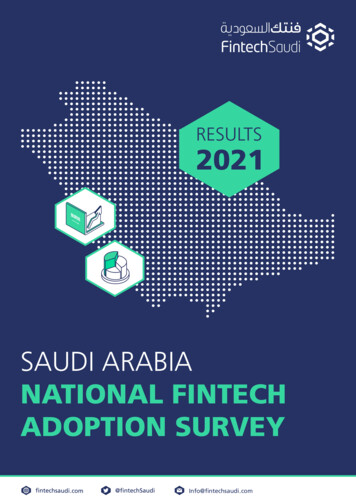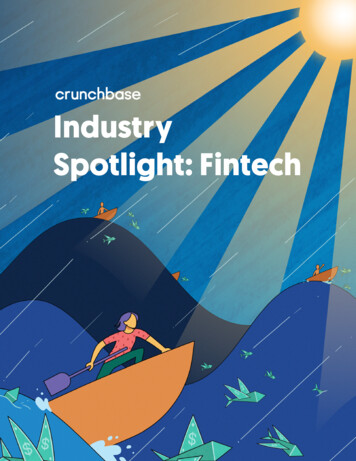
Transcription
IndustrySpotlight: FintechCrunchbase Industry Spotlight: Fintech
About Crunchbase.Crunchbase is the leading provider of private-company prospectingand research solutions. Over 55 million users—including salespeople,entrepreneurs, investors, and market researchers—use Crunchbase toprospect for new business opportunities. And companies all over the worldrely on us to power their applications, making over 3 billion calls to our APIeach year.What is fintech?Fintech is short-form for “financial technology” and includes everythingfrom mobile banking technology to investment apps to cryptocurrency. Asone of the most rapidly evolving sectors, fintech has changed significantlysince banking technology was first introduced in the 1860s. Since then, theinvention of credit cards, e-trade and online banking has quickly progressedthe industry, threatening traditional financial institutions and changing theway people manage their finances.Crunchbase Industry Spotlight: Fintech2
Why we cover fintech.At Crunchbase, we are constantly analyzing our growing dataset andthinking about how to contextualize information to better equip people tomake informed business decisions. Part of this process includes identifyingtrends and sharing complicated data insights in an easily digestible way, soyou don’t need advanced analytics tools or a data science degree to quicklyidentify and understand industry developments.Fintech companies hold 16 percent of the spots on the Crunchbase UnicornLeaderboard, collectively valued at close to 500 billion, per last knowndisclosed or reported valuations. Since 2010, investments in fintech havegrown more than ninefold, with 43 billion invested in 2019 alone.Crunchbase Industry Spotlight: Fintech3
Impact of COVID-19.With the impact of COVID-19 hundreds of millions of people are changinghow they conduct their daily lives. Industries that rely on people gathering toprovide a service have been disrupted in a short time frame. Travel, events,restaurants, and retail businesses have been instantly impacted, castinga wider net on services that supply these businesses. Broad adoption ofsocial distancing measures, along with shutdowns of businesses deemednon-essential, impacts a wide array of companies, including manufacturing,construction, logistics, and supply chain.Investors will be assessing their portfolio companies for risks to theirbusinesses based on a very different consumer and business environment.Consumers will also rely on companies that connect us virtually. As withevery sector, some will fare better than others. Companies that rely on therevenue of impacted industries will see shrinking markets. Those whoseofferings address real needs in a challenging economy will see moreattention.In financial services the underlying trends towards servicing newer marketsegments through online services are accelerated by these changes.The trend towards cashless economies is furthered, as businesses stopaccepting cash in order to stem the transmission of the virus. Loans areexpected to increase, and mortgage refinancings are seeing unprecedenteddemand. According to Ryan Gilbert of Propel Venture Partners, “Balancesheet businesses, specifically non-bank lenders are under tremendouspressure to collect on their issued loans and prove that their lending modelscan actually survive an economic shock like the one we are dealing with. Theconsumer and small business lending sectors seem to be hit the hardest.”Crunchbase Industry Spotlight: Fintech4
Companies providing benefits and services to independent workers becomeimportant in helping non-W2 workers stay covered during this health crisis.Services for the unemployed will become critical as society addresses thosethat are most in need of short and longer term support. Retail banks areshuttering their outlets on a short term basis. Will some of these short termclosures become permanent as services move online?The full economic impact of COVID-19 is still too early to tell but a longterm recession or depression seems likely. “B2B companies will need toprepare for frozen sales pipeline for most of this year and longer salescycles and shrinking budgets in 2021. B2C companies will need to adjustto reductions in consumer spending, greater emphasis on short termcash needs given spiking unemployment, and increased reluctance fromconsumers to switch financial service providers,” said Satya Patel founder ofseed investor Homebrew. “The hardest hit fintech businesses will be lendingbusinesses that have large outstanding loan balances and that will have todeal with lots of uncertain credit risk. In general, an increasing emphasison unit economics over growth, will put some companies in a very difficultfundraising position.”For this report we look at the last decade to provide a lens on the prevailingtrends in fintech.Crunchbase Industry Spotlight: Fintech5
Crunchbase IndustrySpotlight: FintechFintech has been a key arena for investment in the past decade with the riseof challenger banks, innovation in online payments, the changing marketaround lending and insurance, and the launch of cryptocurrencies. With theimpending recession, there will be companies that face a changed marketopportunity and do not make it through. However, fintech will continue tolead as a sector, as financial services become more deeply integrated intothe consumer mobile experience--a bank in your pocket--along with thegrowth in services integrating financial products aimed at both consumersand businesses. The next 10 years are going to be more interesting towatch, with the growth of infrastructure and compliance as a service,allowing more players to enter this ecosystem.Alongside challenger banks in Europe, the U.S., and now Latin America,2,000 newly funded fintech companies per year are chipping away atservices provided by banks and other finance incumbents not limited tochecking, transfers, loans, mortgages, brokerage, insurance, and more.Established public tech companies are building financial products into theirservices, with Google offering checking accounts (via Citigroup and smalllender Stanford Federal Credit Union), Facebook launching Facebook Payto facilitate payments across all its apps, and Apple launching Apple Card(developed by Goldman Sachs) that is linked to Apple Pay -- launchedback in 2014. In China, where credit card penetration is low, mobilepayments represent 83 percent of all payments in 2018, up from justthree percent in 2011 led by AliPay launched in 2004, and WeChat Pay inCrunchbase Industry Spotlight: Fintech6
2013. The Chinese government is planning to launch its own state-backedcryptocurrency on the back of the Facebook Libra mislaunch.The most highly valued private company in the world is Ant Financial valuedat 150 billion. As of February 2020, 90 companies on the CrunchbaseUnicorn Leaderboard (16 percent) are in financial services, collectivelyvalued at close to 500 billion. Fintech received 16 percent of global venturecapital funding in 2019 and 17 percent in 2018, up from 10 percent in 2010.2020 already exceeds 2019 in exits with the pending Visa acquisition ofPlaid and Intuit acquisition of Credit Karma leading the way.Asia leads in payments, Europe in Neobanks, the U.S. in infrastructure, andLatAm in services for the unbanked. Despite the downturn, we will continueto see multiple leading companies in fintech across geographies. Fintechcompanies will reassess their product offerings in light of business andconsumer needs in this changed funding environment.With this report, we dive into the last decade in fintech funding and exitsas we look to the next decade.I.Decade Of Venture Investments Into Financial ServicesII.Leading SectorsIII.Growth In Leading CountriesIV.Active Seed And Venture InvestorsV.Large Exits In 2019VI.90 Fintech UnicornsVII.Investor PredictionsCrunchbase Industry Spotlight: Fintech7
I. Decade Of VentureInvestments Into FinancialIn 2010 fintech represented 10 percent of total venture funding. Fastforward to 2019, fintech held 16 percent of total venture fundingCrunchbase Industry Spotlight: Fintech8
Investments in fintech companies have grown more than ninefold since2010 and more than doubled since 2015. 2019 was the second highest investment year over the last decade with 43 billion invested in fintech. 2018 is an all time high for investment in fintech at 57 billion, with thelargest growth percent year-over-year in late-stage venture. The largestfunding round to a fintech company was raised by Ant Financial -- a 14 billion Series C round in 2018. (The gap in funding between 2019and 2018 decreases to 600 million if you remove Ant Financial’s singleSeries C round from consideration.)Crunchbase Industry Spotlight: Fintech9
Financial services companies attracted a greater proportion of late-stageventure funding rounds in 2018 and 2019. Seed and early stage investments in fintech were at 34 percent in 2019and 32 percent in 2018. Seed and early stage venture represent a higher proportion of investmentdollars, averaging 51 percent from 2010 to 2017.Crunchbase Industry Spotlight: Fintech10
Investments And Deal CountAs of February 2020, year-over-year deal counts were down by 22 percent,but over time will lessen. Much of the difference in funding round countsare attributed to the seed stage -- down 31 percent -- where we see themost reporting delays. At the early venture stage, counts are down by 10percent. Late stage round counts are down by 5 percent. We fully expectthese numbers to go up for 2019 relative to 2018, due to reporting delays.However, 2019 will not exceed 2018 a decade long peak for fintech both infunding count and amount. (Reporting delays for funding amounts are lesspronounced in Crunchbase data.)Crunchbase Industry Spotlight: Fintech11
II. Leading Industries: Lending,Banking, & Insurance Grow YoYLeading financial services industries in 2019 included payments (alongwith mobile payments), insurance, banking, and lending, respectively. Formany companies there is integration between these sectors; for examplecompanies that offer payment and banking services or companies that offerbanking and lending products. We assigned companies a single industryfor this analysis. Industries that grew year-over-year above 75 percentby invested dollars include lending and banking. Insurance grew over 33percent. (Payments did not grow year-over-year due to Ant Financial raising 14 billion in 2018.)Crunchbase Industry Spotlight: Fintech12
The companies that led this innovation wave in insurance include BrightHealth, Clover Health, Root, and Lemonade -- all based out of the U.S. indifferent cities outside of Silicon Valley. In banking, the largest fundings wentto Silicon Valley-based Chime, Berlin-based N26, and Brazil-based Nubank.For lending, the largest funding rounds were led by UK-based GreensillCapital and OakNorth, U.S.-based Affirm, and Australia-based Judo Bank.(See more on these below in the largest funding rounds section).Crunchbase Industry Spotlight: Fintech13
Large Funding Rounds In2019Payments India-based One97, parent of mobile payment services company Paytm,raised a Series G round of 1 billion with funding from T. Rowe Price,Alipay, and Softbank, valuing the company at close to 16 billion. Stockholm-based Klarna, an e-commerce payment solutions platformfor merchants and shoppers, raised 460 million led by DragoneerInvestment Group valuing the company at 5.5 billion. Vietnam-based VNpay, a payment solutions company, raised a 300million round led by Softbank Vision Fund and GIC. San Francisco Bay Area-based Marqeta, a payment card platform forcommerce companies, raised a 260 million Series E led by CoatueManagement valuing the company at close to 2 billion. San Francisco Bay Area based Stripe, a payment processor, raised a 100 million Series E and separately a 250 million dollar Series F roundin 2019. Investors in the Series F include Andreessen Horowitz, SequoiaCapital, and General Catalyst valuing the company at 35 billion.Crunchbase Industry Spotlight: Fintech14
Banking San Francisco Bay Area-based Chime, a challenger bank, which helpsmembers avoid bank fees, raised a 200 million Series D and a 500million Series E both led by DST Global, valuing the company at 5.8billion. Germany-based N26, which offers mobile banking solutions to customersin the European Union, raised a 470 million Series D led by InsightPartners valuing the company at 3.5 billion. Brazil-based Nubank, a new digital bank raised a 400 million Series Fled by TCV valuing the company at 10 billion.Insurance Minnesota-based Bright Health, a provider of health insurance productsand services raised a 635 million Series D led by New EnterpriseAssociates. New Jersey-based Clover Health, a new health insurance company, raiseda 500 million Series E led by Greenoaks Capital. Ohio-based Root, a car insurance company that offers personalized,affordable coverage in an app, raised a 350 million Series E led by DSTGlobal and Coatue Management valuing the company at 3.65 billion. New York-based Lemonade, a full stack insurance company poweredby AI and behavioral economics, raised a 300 million Series D led bySoftBank.Crunchbase Industry Spotlight: Fintech15
Lending UK-based Greensill Capital, a provider of structured working capitalfinancing to businesses globally, raised 800 million and then a further 655 million led by SoftBank Vision Fund. UK-based OakNorth, a credit platform for small businesses globally,raised 440 million led by SoftBank Vision Fund and the Clermont Group. San Francisco Bay Area-based Affirm, a financial technology servicescompany that offers installment loans to consumers at the point-of-sale,raised a 300 million Series F led by Thrive Capital. Australia-based Judo Bank, a lender powered by technology providingpersonal service to SMEs, raised a 276 million Series B with newinvestors Bain Capital Credit and Tikehau Capital.Wealth Management San Francisco Bay Area-based Robinhood, a stock brokerage that allowscustomers to buy and sell U.S. stocks, options, ETFs, and cryptocurrencieswith zero commission, raised a 323 million Series E led by DST Globalvaluing the company at 7.6 billion, San Francisco Bay Area-based Carta, a company building a globalownership management platform to help companies, investors, andemployees manage their equity, raised a 300 million Series E led byAndreessen Horowitz valuing the company at 1.7 billion.Crunchbase Industry Spotlight: Fintech16
III. Growth In LeadingCountriesIn 2019, fintech companies raised 16 billion across 1,057 companiesin the U.S., 5.2 billion across 342 companies in the U.K., 4.6 billionacross 199 companies in India, and 3.7 billion across 147 companies inChina. Germany rounds out the top five with 1.7 billion raised across 83companies. Singapore raised 0.8 billion, but with more companies at 106.With the upswing in investments over 2018 and 2019 in financial services,we look at growth by country year-over-year. Fourteen of the top 17countries grew in investment dollars year-over-year.Countries with year-over-year growth in fintech funding from 2018-2019between 75 and 100 percent include India, Germany, and the U.K. Thecountries that grew the most off of a very low amount in 2018 includeVietnam, Sweden, Australia, and Brazil. For the largest two markets infintech, U.S. funding was up by eight percent year-over-year, and Chinafintech funding was down 86 percent year-over-year from 2018-2019-though invested dollars were fairly close.Crunchbase Industry Spotlight: Fintech17
Crunchbase Industry Spotlight: Fintech18
IV. Active Seed And VentureInvestorsWith the increased investment activity in 2018 and 2019, we thought itwould be of interest to review the most active investors at the seed andventure stages.At the seed stage, Techstars, Y Combinator, and 500 Startups led in thenumber of fintech portfolio companies invested in over 2018 and 2019.Alongside leading accelerator programs three seed stage investors top thislist along with Global Founders Capital, Seedcamp, and SV Angel.Crunchbase Industry Spotlight: Fintech19
The most active venture and private equity investors are geographicallydiverse and represent a mix of leading venture firms, fintech-focusedinvestors, corporate venture, and late-stage alternative investors. Leading bythe number of portfolio companies in 2018 and 2019 were Silicon Valleybased Andreessen Horowitz, with a dedicated fintech practice, and RibbitCapital which invested globally in companies aiming to disrupt financialservices. Third on the list was Anthemis Group, which focused on financialservices based in London, U.K., and New York-based Digital Currency Group,which invests in blockchain. Silicon Valley-based philanthropic investmentfirm Omidyar Network rounds out the top five. Sequoia Capital in China,India and the U.S. are all active investors in fintech, largely in distinctportfolio companies.Crunchbase Industry Spotlight: Fintech20
V. Large Exits In 2019With the increase in funding for fintech companies in 2019, liquidity remainsa concern. 2020 kicked off with two large acquisitions subject to regulatoryapproval. Visa announced the acquisition of Plaid for 5.3 billion, and Intuitplans to acquire Credit Karma for 7.1 billion. These two deals in early 2020already surmount 2019 acquisitions, in which 177 fintech companies wereacquired for a total of 6.1 billion.In contrast, 2018 had 193 acquisitions totaling 12 billion. (For merger andacquisition (M&A) activity data we selected venture-backed companies. Wealso excluded companies who had previously gone public.)Crunchbase Industry Spotlight: Fintech21
We anticipate more M&A activity in fintech in 2020. The largest acquisitionsin 2019 include: iPipeline, a provider of sales distribution software to insurance andfinancial services companies, was acquired by Roper Technologies for 1.6 billion. Kony, a mobile application developer for fintech companies, was acquiredby Temenos for 559 million. PrecisionLender, which provides information for banks to accurately pricea loan to a borrower, was acquired by Q2eBanking for 510 million. Ebury, which allows small and mid-size companies to make and receivepayments in foreign currencies, was acquired by Banco Santander for 451 million. Wave, which enables payments and payroll for small businesses, wasacquired by H&R Block for 404 million.Crunchbase Industry Spotlight: Fintech22
VI. 90 Fintech UnicornsWith 580 global private unicorns, 90 (16 percent) are in financial services asof February 2020. Collectively, fintech unicorns have raised 76 billion andare valued at close to 500 billion. The most highly valued fintech unicornsinclude Ant Financial, Lu.com, JD Digits, and Bitmain from China, Stripe andRipple from the U.S., One97 from India, and Nubank from Brazil.ANT FinancialAnt Financial is an online payment services provider that enables individualsand businesses to execute payments online in a secure manner. Raised: 18.5 billion Post Money Value: 150 billion Location: Hangzhou, ChinaLu.comLu.com is an online marketplace for trading of financial assets. Raised: 3 billion Post Money Value: 39 billion Location: Shanghai, ChinaCrunchbase Industry Spotlight: Fintech23
StripeStripe is a global technology company that builds economic infrastructurefor the internet. Raised: 1 billion Post Money Value: 35 billion Location: San Francisco, U.S.JD DigitsJD Digits (formerly JD Finance) works to connect financial and physicalindustries with digital technology. Raised: 5 billion Post Money Value: 18 billion Location: Beijing, ChinaOne97 CommunicationsOne97 delivers mobile content and commerce services to its customers. Raised: 4.4 billion Post Money Value: 16 billion Location: Noida, IndiaCrunchbase Industry Spotlight: Fintech24
BitmainBitmain is a design and manufacturer of high performance computing chipsand software. Raised: 765 million Post Money Value: 12 billion Location: Beijing, ChinaRippleRipple allows users to send money globally using the power of blockchain. Raised: 292 million Post Money Value: 10 billion Location: San Francisco, U.S.NubankNubank issues, administrates, processes, and transfers payments related topost-paid credit cards and equity investment in other entities. Raised: 725 million Post Money Value: 10 billion Location: São Paulo, BrazilCrunchbase Industry Spotlight: Fintech25
VII. Investor PredictionsFor this report we spoke with numerous investors focused specifically onfinancial services as an area of innovation.“Expect to see many software companies, digital marketplaces andcommerce companies across industries introduce financial productsthat drive down costs or create new revenue streams for customers byleveraging API-based technologies offered by fintech startups.” Satya Patel,Homebrew“Fintech is driving new business models as opposed to being a businessmodel in its own right,” according to Ryan Gilbert at Propel VenturePartners. “More and more categories will include fintech elements in order tobe competitive. For e-commerce trends, or new ways of servicing verticals-for example cosmetics, hairdresser and barbershop verticals--these bookingsystems are providing full operating systems for large parts of the economy.”“More focus will be placed on B2B products and services that shore upthe foundation for B2C fintech startups and traditional financial servicescompanies. Instead of emphasizing growth, companies will try to operatemore securely and efficiently. Key areas include compliance, servicing andidentity.” Satya Patel, Homebrew“We believe one of the most important trends in fintech is the rise of a newgeneration of financial infrastructure companies (akin to AWS or GoogleCloud Services). These financial infrastructure companies -- like Galileoand Marqeta -- are enabling any business to offer financial products (likedebit cards, overdraft protection, savings plans, or credit). As a result, newCrunchbase Industry Spotlight: Fintech26
‘fintech’ brands - like Chime, Sofi, or Divvy - are growing faster than eversince they no longer have to build core banking products themselves; theseproducts are accessible via APIs.” Cherry Miao, Accel“The sharing economy, in certain parts of the world, is breaking into fintechway beyond the expectations.” said Ryan Gilbert of Propel Venture Partners.“This is driven in part by peer to peer transactions in payments, lending andinsurance.”“Although we are in uncertain times due to COVID-19, the market dynamicsremain interesting in LatAm, particularly in Brazil and Mexico. Both are stillsubstantially cash-based economies with mobile phone penetration over 70percent, so there is an opportunity to deliver digital financial services tailoredfor consumer and small to midsize enterprise (SME) audiences that fill thegaps left by traditional financial institutions that often require in-personinteraction for delivery of financial services products.” Michael Sidgmore,Broadhaven Ventures.“All of the fintech companies with products that have achieved significantconsumer scale will work to introduce complementary products, such assavings, debit, credit, lending and investing, to round-out their offerings andto drive customer engagement and loyalty.” Satya Patel, HomebrewCrunchbase Industry Spotlight: Fintech27
MethodologyThis report is based on data in Crunchbase as of Feb. 27, 2020.Industries in Crunchbase are not exclusive. A company can be in more thanone industry and in more than one industry group.For Financial Services we include the following leading industries: Banking,Insurance (InsurTech), Lending, Payments (Mobile payments), PersonalFinance, and Wealth Management.All Financial Services Industries Accounting, Angel Investment, AssetManagement, Auto Insurance, Banking, Bitcoin, Commercial Insurance,Commercial Lending, Consumer Lending, Credit, Credit Bureau, CreditCards, Crowdfunding, Cryptocurrency, Debit Cards, Debt Collections,Finance, Financial Exchanges, Financial Services, Fintech, Fraud Detection,Funding Platform, Gift Card, Health Insurance, Hedge Funds, ImpactInvesting, Incubators, Insurance, InsurTech, Leasing, Lending, Life Insurance,Micro Lending, Mobile Payments, Payments, Personal Finance, PredictionMarkets, Property Insurance, Real Estate Investment, Stock Exchanges,Trading Platform, Transaction Processing, Venture Capital, Virtual Currency,Wealth ManagementCrunchbase Industry Spotlight: Fintech28
For this report we look at reported--not projected data, which means that2019 numbers will increase over time, relative to previous years. Privatemarket financing data is subject to reporting delays. Numbers may havechanged since publication as more data gets added to Crunchbase.Please note that all funding values are given in U.S. dollars unlessotherwise noted. Crunchbase converts foreign currencies to U.S. dollars atthe prevailing spot rate from the date funding rounds, acquisitions, IPOsand other financial events are reported. Even if those events were addedto Crunchbase long after the event was announced, foreign currencytransactions are converted at the historic spot price.Crunchbase Industry Spotlight: Fintech29
Glossary of Funding Terms Seed/Angel includes financings that are classified as a seed or angel,including accelerator fundings and equity crowdfunding 3 million andbelow. Early stage venture includes financings that are classified as a Series A orB, venture rounds without a designated series that are above 3 millionand equal to or below 15M. Late stage ventures include financings that are classified as a Series C and venture rounds without a designated series greater than 15M. Note: Fundings denoted by Crunchbase as private equity are not includedin this report.Special thanks go to the following investors; Satya Patel Founder, Homebrew John Locke Partner and Cherry Miao, Accel Ryan Gilbert Partner, Propel Venture Partners Michael Sidgemore Partner, BroadHaven Ventures, Howard Lindzon Founder & General Partner, Social LeverageCrunchbase Industry Spotlight: Fintech30
43 billion invested in fintech. 2018 is an all time high for investment in fintech at 57 billion, with the largest growth percent year-over-year in late-stage venture. The largest funding round to a fintech company was raised by Ant Financial -- a 14 billion Series C round in 2018. (The gap in funding between 2019

